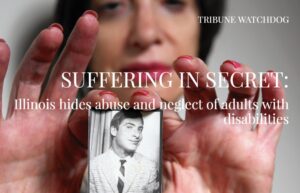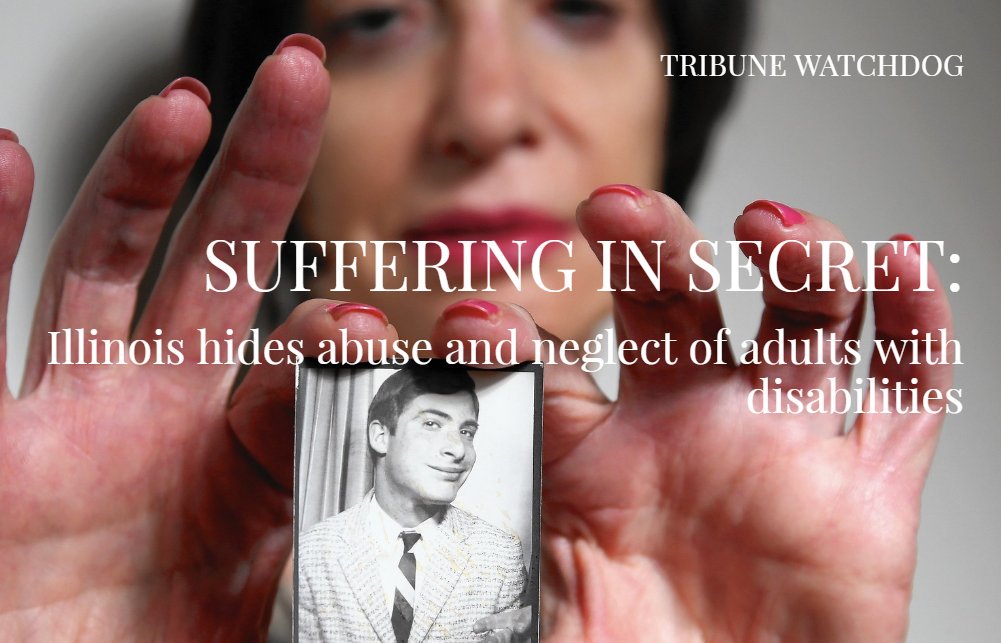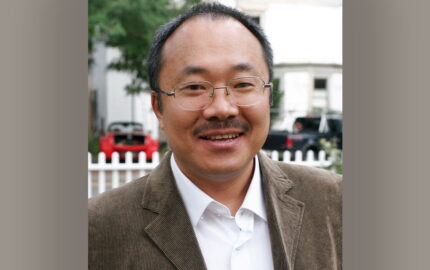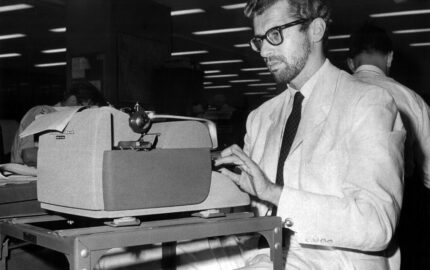 The Chicago Tribune’s three-part series “Suffering in Secret,” is winner of the 2016 Worth Bingham Prize for Investigative Journalism. The result of a yearlong investigation into the abuse and neglect of adults with disabilities in Illinois, the series has led to important reforms to remedy wrongdoing and provide new protections for victims.
The Chicago Tribune’s three-part series “Suffering in Secret,” is winner of the 2016 Worth Bingham Prize for Investigative Journalism. The result of a yearlong investigation into the abuse and neglect of adults with disabilities in Illinois, the series has led to important reforms to remedy wrongdoing and provide new protections for victims.
In the series, Tribune reporters Michael J. Berens and Patricia Callahan revealed mistreatment inside Illinois’ taxpayer-funded group homes and their day programs. They discovered that caregivers often failed to provide even basic care and regulators concealed instances of serious harm and death. They also found that Illinois had directed thousands of poor adults with developmental and intellectual disabilities away from state institutions into less expensive private group homes.
Among their findings: Illinois publicly undercounted abuse and neglect cases for five years and the Human Services inspector general allowed group home employees to police their own businesses. The reporters identified more than 1,300 cases of harm since July 2011 and tracked at least 42 deaths linked to abuse or neglect over the last seven years. The reporters also found that lawmakers had exempted the group home industry from public accountability. The public, family members and even group home residents themselves were not allowed to know if the state had followed up on complaints against a home or if changes had been ordered and implemented.
The series additionally reported that in an attempt to close a state institution before unions and guardians could object, Illinois officials held a hastily arranged meeting during which they read medical histories of residents and asked group home representatives to make selections. Files showed that theses group homes were underfunded, understaffed and dangerously unprepared for new arrivals with complex needs.
In the course of their reporting, Berens and Callahan worked with more than 100 Freedom of Information Act requests, thousands of pages of court records, investigative files from multiple agencies, state email records, law enforcement reports and medical records. They cross-referenced public records to determine where group homes were located to circumvent Human Services’ information blackout and compiled a database to identify cases and patterns of abuse.
The series has led to a number of important reforms:
- Citing “imminent risk,” the Illinois Department of Human Services revoked the license of a group home network spotlighted in the Tribune’s investigation and relocated 45 adults with developmental disabilities to new homes.
- Illinois Senate and House lawmakers held a rare joint hearing, during which they promised new laws and increased public accountability.
- Human Services reopened two neglect investigations spotlighted by the Tribune and promised to unseal more than 1,000 investigations for parents and guardians who seek group home enforcement history.
- State officials retracted five years of erroneous group home statistics on abuse and neglect cases and republished corrected numbers on the state website. They also stopped allowing group home employees to investigate their own businesses.
- The state is creating a public report card for all group homes.
The team members who produced the series were reporters Michael J. Berens and Patricia Callahan; investigations editor George Papajohn; watchdog editor Kaarin Tisue; photographer John J. Kim; copy editor Colleen Kujawa; digital design and presentation editor Rebecca Halleck; assistant data and graphics editor Ryan Marx; and visuals editor Andrew Johnston.
Berens won the 2010 Bingham Prize as a reporter at The Seattle Times for his series “Seniors for Sale: Exploiting the aged and frail in Washington’s adult family homes.”
In making their selection, the Bingham Prize judges noted the Tribune quite literally gave voice to the voiceless, the nameless and the unheard.
Bingham judge Jacquee Petchel said: “This entry epitomizes the intent of the Worth Bingham prize. It had distinct and powerful findings. It was easy to read, eloquently presented and took a massive public records endeavor and data analysis to report and write. Furthermore, it resulted in tangible action, with the state revoking the license of a group home network, renewed investigations into some cases, and banning the practice of group homes operators investigating their own cases.”
Another Bingham judge, Michael LaForgia, added: “Though the topic sounds familiar—disabled people in group homes dying or being abused—I never felt like we were running over previously plowed ground. The emphasis on secrecy helped that, and so did the jarring findings about self-policing.”
Celebrating 50 years of excellence in reporting
The $20,000 Bingham Prize will be presented to the Chicago Tribune on May 4, 2017, at the Nieman Foundation for Journalism at Harvard University in Cambridge, Mass. This year marks the 50th anniversary of the prize, which many of the country’s best investigative reporters have won since the award was established in 1967. To mark the occasion, a panel of former winners—including Michael Rezendes from The Boston Globe, Dana Priest from The Washington Post and Audra Burch from The Miami Herald, who recently started a new position at The New York Times—will join one of this year’s winners from the Chicago Tribune to discuss the impact and importance of investigative reporting.
The seven journalists who judged the more than 100 Bingham submissions received this year are: last year’s Bingham Prize winners Cara Fitzpatrick and Michael LaForgia from Tampa Bay Times (LaForgia recently joined the new investigations team at The New York Times); Phillip Reese, a Sacramento Bee reporter who was part of the team that won the 2013 Bingham Prize; Jacquee Petchel, executive editor of the Carnegie-Knight News21 multimedia investigative reporting initiative at Arizona State University; Jim Schaefer, an investigative reporter/columnist at the Detroit Free Press and part of the team that won the 2008 Bingham Prize; Stuart Watson, an investigative reporter based in Charlotte, N.C., and a 2008 Nieman Fellow; and Mariah Blake, and investigative reporter and a 2016 Nieman Fellow.

The Worth Bingham Prize honors investigative reporting of stories of national significance where the public interest is being ill-served. Worth Bingham, who died at the age of 34, achieved prominence as an investigative journalist and was vice president and assistant to the publisher for the Louisville Courier-Journal. He was a 1954 Harvard University graduate. His family and friends created the prize in his memory in 1967.
The Nieman Foundation for Journalism at Harvard educates leaders in journalism and elevates the standards of the profession through special programs that convene scholars and experts in all fields. More than 1,500 journalists from 94 countries have been awarded Nieman Fellowships since 1938. The foundation’s other initiatives include Nieman Reports, a website and quarterly print magazine that covers thought leadership in journalism; Nieman Journalism Lab, a website that reports on the future of news, innovation and best practices in the digital media age; and Nieman Storyboard, a website that showcases exceptional narrative journalism and explores the future of nonfiction storytelling.



